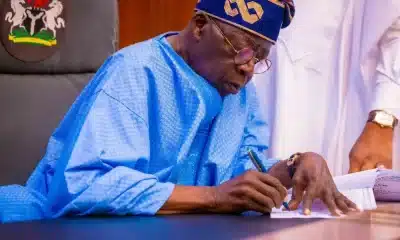Editorial
Nigeria Must Get Serious About Arresting Oil Theft

Ever since the Russia-Ukraine war shot up crude prices from $97 per barrel to $125, oil-resourced countries, barring Nigeria, have been having the time of their life. Yet, this is a country where the oil and gas sector accounts for nine per cent of the Gross Domestic Product, contributes about 65 per cent of national revenue and almost 90 per cent of foreign exchange earnings. The paradox of Nigeria’s poverty when she should join her peers in the prosperity party is not lost on the world. On Monday, The Economist of London published an article with the title: How oil-rich Nigeria failed to profit from an oil boom. There was also the September 2022 report of the Organization of Petroleum Exporting Countries (OPEC), where Angola and war-torn Libya overtook Nigeria as Africa’s leading exporters of crude oil. Then again, Reuters’s story captioned: “Nigeria’s oil output at 32-year low as thieves hobble output” which signposts why an unstable and highly volatile Libya is producing more crude oil than Nigeria.
If the North African country with different warlords battling for its soul can average a monthly 1.123m barrels per day (bpd), much more is expected of Nigeria with a President who doubles as the Minister of Petroleum Resources. Figures released recently by the Nigeria Upstream Petroleum Regulatory Commission show that Nigeria’s crude oil production crashed to 972,394 barrels per day last month, making it the lowest ever in decades. This is a slump from the 1,083,899 bpd recorded in July. Notwithstanding the current high global price of crude oil, Nigeria’s net oil revenues are now about 40 per cent lower than the figures of last year.
It’s hard to reconcile what now obtains with the 2 million barrels per day of crude oil exports averaged by Nigeria as of October 2015. Not even in the height of crippling militant attacks in the Niger Delta did Nigeria’s oil output fall below 1.4 million bpd! As was captured in the Reuters report, Nigeria has been pushed to this unenviable position by oil thieves against whom the federal government with all its might seems helpless. As it stands at the moment, 400,000 barrels of crude oil are lost daily. In the first four months of 2022, data from the Nigerian National Petroleum Company, NNPC Limited showed that Nigeria was losing about 250, 000 barrels per day of crude oil to theft, bringing the total loss to about $1.5 billion.
The failure of the federal government to decisively block this leakage given the acute revenue deficit buffeting is bewildering, little wonder a Senior Advocate of Nigeria, Femi Falana said that government officials were involved in crude oil theft and smuggling of petroleum products in the country. This is not the first time there will be claims of collusion between security operatives and government officials in the bare-faced thievery going on in Niger Delta creeks. Rather than address the roots of this organized crime, the Buhari government through the Nigerian National Petroleum Company, NNPC Limited reinstated a previously revoked oily deal to a private contractor.
It is beyond Naija News how the federal government could live with re-awarding the pipeline surveillance contract to the company promoted by a former Niger Delta militant, Government Ekpemupolo, alias Tompolo, after cancelling same. This job, for which the government will be paying a princely N4 billion per month, is ordinarily within the remit of the Nigerian Navy and the Nigerian Security and Civil Defence Corps (NSCDC). Isn’t this akin to hiring mercenaries to fight the war on terror when there is a standing army? Though innocent until proven guilty, Nigerians can still remember that Ekpemupolo was in 2016 declared wanted by the EFCC following bench warrants for his arrest by a Federal High Court in Lagos. This was over his involvement in the alleged diversion of N45.9 billion belonging to NIMASA. Although his registered company bears a unique identity, the Buhari government clearly threw decency and deterrence to the wind by reinstating the contract, which in its former life did not entirely stop pervasive oil theft.
This untidy arrangement is now threatening the peace of the Niger Delta, as was rightly observed by Niger Delta activist and community leader, Chief Rita-Lori Ogbebor, who while demanding an urgent withdrawal of the pipeline contract awarded to Tompolo, a move described as an invitation to anarchy. Ever since the re-award of the contract became public knowledge, Tompolo’s contemporaries have been claiming the right to equally be engaged by the government to protect oil installation in their communities. A rival ex-militant warlord and leader of Niger Delta People Volunteer Force, Mujahid Dokubo-Asari has warned Ekpemupolo’s staff to steer clear of his Kalabari ancestral homeland. Youths of the oil-bearing Ibeno LGA of Akwa Ibom State have vowed to resist any attempt by the contractor-company to operate in their territory. Urhobo and Edo youths are separately asking for similar contracts, vowing not to allow Tompolo and company veer near their vicinity. This resistance comes with an underlying threat of violence, making this newspaper wounder why the government will touch the tail of a sleeping tiger. The NNPC must be reminded of the African adage that a person who fetched ant-infested firewood should be ready to dine with lizards. We really pray it doesn’t get to that.
Naija News understands that the government must have acted in desperation given the industrial-scale theft of Nigeria’s oil resources, that has laid the economy prostrate. Nigeria is grappling with a yearly widening budget deficit, which stands at N7 trillion for the 2022 fiscal year alone. Lately, President Muhammadu Buhari approached the National Assembly to borrow N965.42 billion from the domestic market to fund the deficit in the 2022 budget. All these are happening when Nigeria’s balance sheet should be healthy due to the high crude oil price in the global market. The government must turn its attention to its officials and security operatives, who are neck-deep in the bare-faced thievery going on in Niger Delta creeks. The NNPC Chief Executive, Mele Kyari, recently disclosed that high-placed Nigerians, including religious, community leaders, and government officials, were fully involved in crude oil theft going on in the Niger Delta.
Since the government knows this, why isn’t it going after these criminals? Wouldn’t that have paid the country more than having to reinstate the controversial contract to a fugitive? Throwing money at problems rather than addressing the roots should not be the strategy in this circumstance. Since the crude oil that is stolen from Nigeria is sold in the international market, the government should leverage the Lloyds Intelligence Report to track and bring the perpetrators to justice. Naija News advocates the installation of LACT units, installation of check meters with flow rate and pressure measuring capabilities on oil installations in the country to forestall their breach. Meanwhile, the buy-in of the people will go a long way in curbing crude oil theft. It is for this reason that the federal government must get serious about implementing the NDDC master plan rather than enriching just a few to the detriment of the common good of the Niger Delta people.
Abuja must be more sensitive to the cry for justice by the people of Niger Delta. Conscious efforts must be made to correct the notion that the government is ready to sacrifice the people for what it can exploit from their land. If the army and the air force can incorporate the non-kinetic approach to this war against bandits and terrorists, the navy must do more at this time to gain the trust, cooperation and support of local communities in the Niger Delta. Naija News calls on all Nigerians to be more concerned about oil theft menace in the coastal belt of the country. This is because the staggering revenue loses it engenders is what inspires government to look towards imposing more taxes and levies or mull the removal of subsidies.











